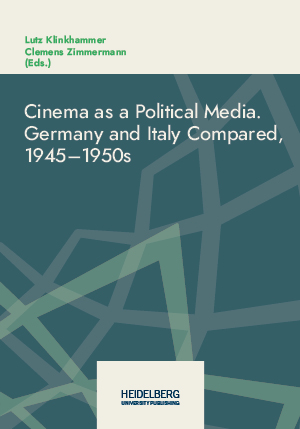Zitationsvorschlag
Identifier (Buch)
Veröffentlicht
Politics, Moral and Cinema. Catholic Film Work in Post-war Germany
The Catholic Church saw itself as the central moral authority in the immediate post-war era and aimed at a political and social “rechristianisation” after the crimes of the Nazi era. As film was supposed to be a central device for this reeducation, the Church already dealt with this medium intensively at an early stage. “Travelling cinema” arose in Germany’s Catholic (rural) areas in order to make the presentation of films and subsequent discussions possible – even in the smallest towns. New jobs regarding the work with films were created in all dioceses, even though there was no institutional organization, such as the Italian “Catholic Action”. In the political field, the Church intervened mainly with regard to movies perceived as “bad”. “Good” and “bad” were determined exclusively by moral criteria rather than cinematic aspects. Politicians were consulted as well as members of the film industry during protests. But basically the strong position of Catholic representatives in the “Voluntary Self-Regulation Body of the Movie Industry” (Freiwillige Selbstkontrolle der Filmwirtschaft) offered the opportunity to establish Catholic arguments in the German film censorship. In support, the “Filmliga” was founded in 1950 and agitated as a mass organisation for the “good” film, following the example set by the “League of Decency” in the US. The peak of the Catholic film work in post-war Germany was the mass protest against the movie “Die Sünderin” which became the biggest film scandal in Federal German history. Neither did the protest achieve the movie’s prohibition or a voluntary dismission, but the public discussion led to a reinforcement of the film work in the ecclesiastical area. Until the 1950s, Catholic film work mainly supported harmonic movie material produced in Federal Germany, whereas Italian movies hardly played a role.







